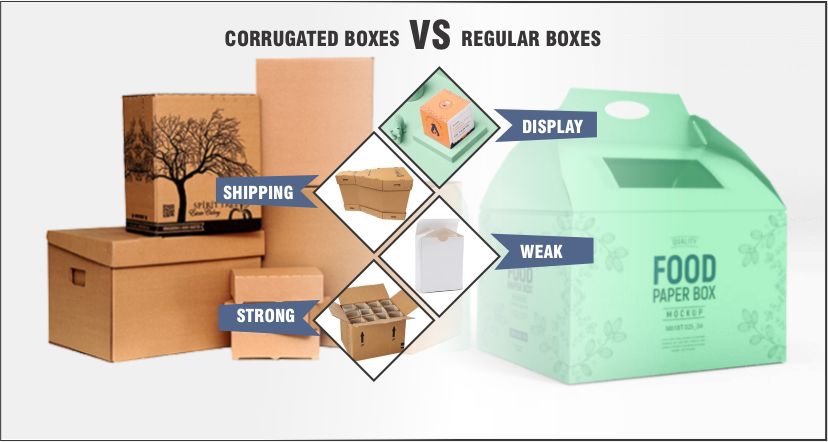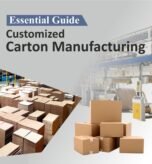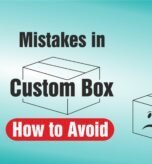Choosing the right box for your packaging not only helps protect your goods but also represents your brand and shapes the first expression your customers experience. Yet, businesses often get confused to understand the difference between corrugated cartons and regular boxes.
By understanding these differences, you can make smarter and cost-effective decisions for your packaging needs. Let’s explore what sets corrugated and regular boxes apart and why it matters for your business.
What is a Corrugated Box?
The term “Corrugated Box” defines a package made from three layers of paper: an inner liner, an outer liner, and a middle wavy layer known as fluting. The multiple stacked layers within a corrugated box gives the carton strength, durability, and cushioning and makes it ideal for protecting products during shipping and handling.
What is a Regular Carton?
Non-corrugated boxes, often referred as folding cartons, are usually made from a single layer of paperboard. The sleek surface of folding cartons is great for high-quality printing, which is ideal for branding and marketing purposes. These boxes are lightweight, easy to fold, but not durable for shipping and are vulnerable when exposed to extreme weather conditions or moisture.
Key Differences between Corrugated Cartons and Regular Boxes
Understanding the difference between a cardboard box and a corrugated box is crucial when selecting storage and shipping options. Corrugated cartons and regular boxes differ primarily in their material structure, strength, usage, and production costs.
Let’s explore the key differences between Regular Boxes and Corrugated Cartons and know what makes them different.
Material and Structure
Corrugated cartons usually consist of multiple layers of sheets which include a fluted middle sheet to enhance their rigidity as well as their shock-absorbent properties. The material composition of regular boxes consists of one single layer of paperboard sheet without fluting that makes them lighter but more flexible.
Strength and Durability
Corrugated cartons possess excellent protective strength which makes them ideal for shipping and handling items that are heavy, fragile or valuable. Regular boxes lack strength, so they are best suited for the items that are light and do not require heavy-duty protection.
Sturdiness
The primary distinction between a carton box and corrugated box is the sturdiness. Corrugated boxes are difficult to bend or shape than cardboard ones due to their more complex composition.
Cost and Efficiency
Regular cartons are generally cheaper to produce and ship because they use less material and are lighter in weight. Corrugated cartons cost slightly more but save you money in the long run by minimizing product damage.
Printing and Appearance
Typically, cardboard is the preferred option for consumer packaging as it offers better print quality and aesthetics and can be printed with a wide variety of textures and colours. Due to their rough surface, corrugated boxes are more commonly printed with only simpler designs.
Environmental Impact
Both regular boxes and corrugated boxes are recyclable and made from eco-friendly materials. Corrugated cartons often have higher reuse potential due to their strength, while folding cartons decompose faster and have a smaller material footprint.
Choosing the Right Packaging: Why It Matters
Choosing the right type of packaging is not just about looks or protection but it affects multiple aspects of your business operations. At Jahangir Packages, our packaging experts work with you to choose between corrugated or regular boxes and help guide you to the ideal choice for your business.
Let’s see why finding the perfect packaging solution matters for your unique business needs.
Product Safety
The use of wrong type of packaging can result in damaged goods, dissatisfied customers, and increased return rates. Using protective packaging like corrugated cartons reduces these potential risks.
Cost Efficiency
Financial losses stem from spending too much money on extra packaging materials alongside inadequately protective packaging. Regular folding cartons are cost-effective for retail but fail to provide enough protection for heavy shipping.
Logistics and Storage
The stacking ability of corrugated cartons together with their uniform support system optimizes warehouse management. Folding cartons occupy minimal storage space and are easier to store when flat-packed.
Customer Experience
The unboxing of a package specifically in e-commerce creates lasting first impressions for customers. Products packed effectively to provide both safety measures and attractive designs lead to more satisfied customers.
Customization
Corrugated boxes are a better choice if your product or brand makes use of custom packaging as they allow much customization than cardboard. Die-cuts, custom opening folds and flaps, and other customized features offer unique design elements without risking the contents inside.
When to Use Corrugated Cartons
When strength and protection are your top priorities, corrugated cartons should be your choice for packaging. This includes shipping goods over long distances, packing products that are heavy, fragile, or valuable, and storing items for extended periods.
Some common uses include:
- Shipping electronics, appliances, or glassware
- Exporting goods in bulk
- Packaging industrial or agricultural products
- Stacking heavy items in warehouses
When to Use Regular Boxes
When visual appeal, shelf presence, and cost-efficiency are your primary concerns regular cartons are the perfect choice. They are mostly used in industries where packaging also serves as a marketing tool.
Common uses for folding cartons include:
- Packaging food items like cereals, snacks, or tea
- Branding cosmetics or health and wellness products
- Designing eye-catching gift boxes or promotional packs
- Pharmaceuticals and medicine
Jahangir Packages’ Expertise in Corrugated Packaging
At Jahangir Packages, we take pride in being experts in corrugated boxes, crafting bespoke packaging solutions for companies seeking secure and eco-friendly options. We offer a wide range of choices, including single, double, and triple-wall corrugated boxes, designed to suit your unique product requirements and guarantee optimal protection during the shipping process.
Gaining insight into the differences between corrugated and non-corrugated boxes will help you choose the best packaging materials for your needs. Jahangir Packages, a leading corrugated box manufacturer, offers you everything required to ensure a smooth shipping experience.
Contact Jahangir Packages today to learn more about corrugated packaging and how we can help you to the ideal choice for your business.





